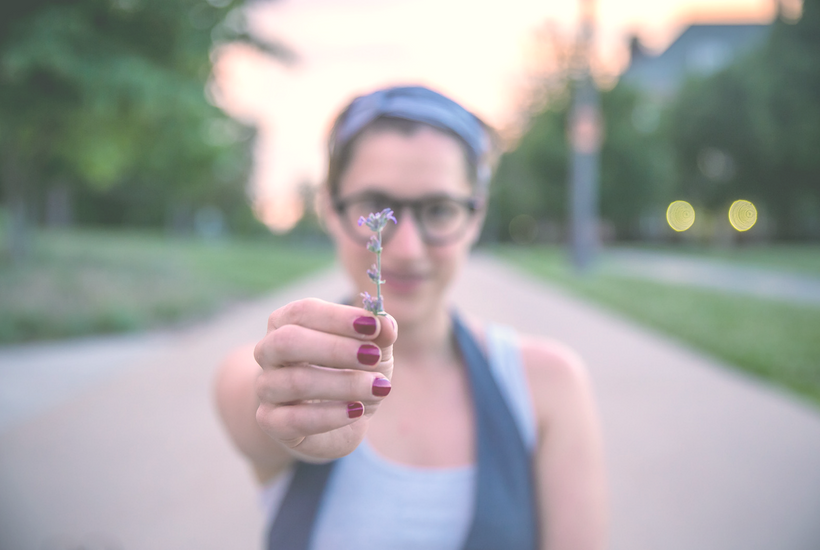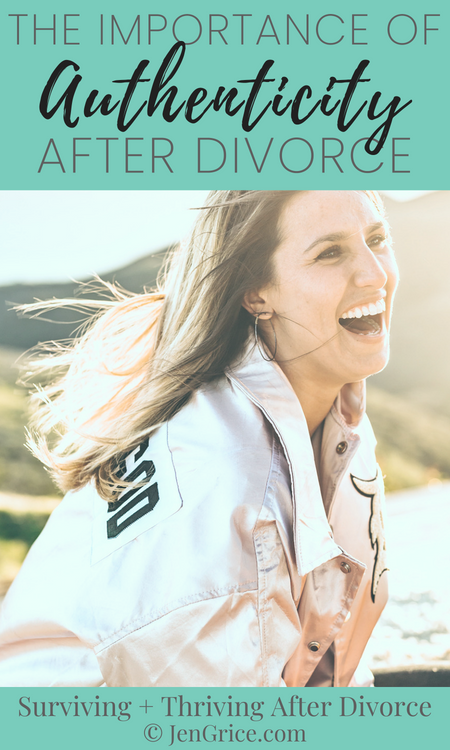Authentic: true to one’s own personality, spirit, or character; is sincere and authentic with no pretensions (Source)
A couple years after my divorce I embarked on a year plus of working on being more authentic. I had spent far too long following what others wanted that I had lost who I really was and what I really wanted for my life.
Being more authentic has helped me in my healing journey, to process what I had been through, the mistakes I’ve made, and then find the support system (of authentic relationships) that I really needed during that time… and still today.

Before that I struggled with authenticity because I feared the rejection and backlash that comes with no longer living to appease the toxic or dysfunctional people in my life. Especially during a divorce, when we’re already facing so many losses, we might feel like we just can’t handle any more loss… so we stay silent, go along with the crowd, and pretend everything is okay, even when it’s not.
The topics of rejection, identifying toxic people and their behaviors, and strengthing your core (to be a strong woman) are on my list to write about in the coming weeks, so today I’m going to explain why it’s important to practice authenticity while you’re working through your divorce recovery.
Authenticity is not something we have or don’t have. It’s a practice — a conscious choice of how we want to live. Authenticity is actually a collection of choices, choices that we make every day. It’s the choice to show up and be real. The choice to be honest. The choice to let our true selves be seen. – Brené Brown (The Gifts of Imperfection: Let Go of Who You Think You’re Supposed to Be and Embrace Who You Are)
Freedom to practice boundaries.
Authentic people are able to express their opinions and feelings freely and clearly. Most of the time they feel comfortable with their own emotions and aren’t bothered when other people don’t accept them or understand them. They’re just open, transparent, and consistent in who they are without being swaying by negative external forces.
Authentic people don’t feel the need to satisfy someone else’s criteria or expectations – that would be superficial. Instead, they just live authentically through boundaries and the set standards they have for their life.
Learning to love yourself enough to have boundaries and assert them is hard, especially if you’ve never done it before. But each time you decide your boundary is not going to be crossed, you’re taking one step in the right direction towards becoming emotionally healthy.
[You May Also Enjoy: 3 Ways to Know You Need Better Boundaries]
Find out who the safe people are.
Feeling comfortable to have boundaries is the first step, asserting them in the second. When you assert your boundaries with toxic people, they’ll get upset and try to tell you that you’re wrong to do so or for having. To them, it’s a competition between who’s right and who’s wrong – who knows more and who knows less. Authentic people don’t compete.
And we’re not worried about being right. We’re just doing what is best for ourselves – allowing others to live their lives how they choose to. We don’t control others but we don’t let others control us. When people fight you over how they want you to be, they’re not safe people. When people are looking to find faults in you, knowing we all have them, they’re not safe.
A toxic person is defensive and deceptive – always having motives. They’re always looking for someone to blame for the bad things that happen or things that they do. And there will always be those nice people (like us) who are willing to take the blame for anything and everything. I used to be one of those people but not anymore! Becoming more authentic changed that about me.
Authentic people are drawn to other authentic people.
While going through that vulnerable time of divorce, I became close friends with a few women in my local homeschool group. At the time I thought I had met lifelong friends. But once I had worked through my healing I realized the truth about many of these women. One was using me to take the blame for things she was doing to ladies in the community (calling CPS on other moms but saying I did it when I never did).
I just couldn’t accept these friendships anymore because they weren’t people who would allow me to be me, my authentic self. I no longer wanted one-sided or deceptive friendships. And I was no longer drawn to dishonest and passive-aggressive people. Now, I only feel comfortable with like-minded people; this keeps us both emotionally healthy.
Authenticity helps you to heal (including your past).
Authentic people work on deep thinking and being self-reflective. We’re able to look into our hearts to view any motives we may have had and wrong choices we have made. Authenticity helps us to accept our mistakes and learn from them. This becomes especially helpful in healing after divorce.
When we can accept the truth about our situation and don’t live a lie, we are being authentic. When we choose not to be a victim of circumstances, we are better able to take responsibility for our future. Things may have been done to us (which was not our fault) but we’re moving forward into healing after. Instead of waiting for things to change, we embrace the truth about the situation and work through the healing process.
[socialrocket-tweet quote=”Being authentic will help you to heal after divorce.” tweet=”Being authentic will help you to heal after divorce. “]
Authenticity helps to release divorce shame.
Through talking with many women over the last month or so, I’ve learned that many carry with them a sense of shame for being divorced. It’s hard to say, “I’m divorced” and explain why a husband is no longer around. Carrying that shame or even guilt over the fact that we’re now divorced is a heavy burden. But we need to release it.
That’s why the first topic I plan to cover in an upcoming (females only) Surviving Divorce Workshop is “Releasing That Shame and Guilt.” I hope you’ll make plans to join me or watch the replay after. There is so much we can talk about and work through together… on this journey to thriving after divorce.

[You May Also Enjoy: Not Allowing Fear to Control Your Future During Divorce]
Are you practicing being more authentic after divorce?
May God bless your healing journey,





Jen, thank you so much for sharing your heart! I too have been oddly drawn to passive-aggressive people and then wonder why I am not at peace with the relationship. This is a habit that is not healthy and needs to be broken by setting healthy boundaries. So glad you have shared your insights on this and continue to shine the light for the rest of us to help us on our journey of healing.
You’re welcome. I can relate. Setting boundaries is not easy. But it does lead to a more peaceful life once we accept that those passive-aggressive people might be angry or not want to speak to us again.